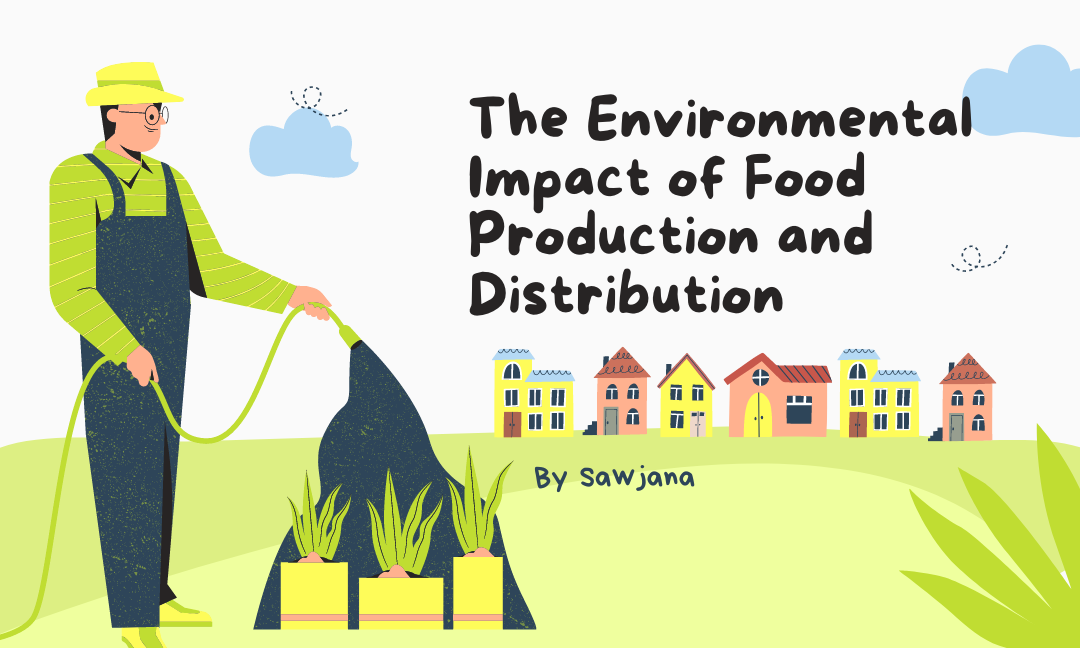Written by: Sawjana
Edited by: Kiritika Rana
Designed by: Keya Patel
Published by: Kiritika Rana
 In an era of growing concern over environmental issues, examining the profound impact of food production and distribution on our planet is imperative. As we grapple with a rapidly expanding global population and the need to ensure food security, it becomes crucial to understand the ecological consequences of our dietary choices. This blog post delves into the environmental implications of food production and distribution, shedding light on critical issues and exploring potential solutions for a more sustainable future.
In an era of growing concern over environmental issues, examining the profound impact of food production and distribution on our planet is imperative. As we grapple with a rapidly expanding global population and the need to ensure food security, it becomes crucial to understand the ecological consequences of our dietary choices. This blog post delves into the environmental implications of food production and distribution, shedding light on critical issues and exploring potential solutions for a more sustainable future.
- Food Production and Land Use:
Food production is intimately linked to land use, with agriculture occupying a substantial portion of our planet’s surface. Expanding croplands and grazing areas have resulted in deforestation, habitat loss, and biodiversity depletion. In addition, the conversion of forests and grasslands diminishes natural carbon sinks and contributes to greenhouse gas emissions. Sustainable land management practices, such as agroforestry and precision agriculture, can mitigate these environmental impacts.
- Water Consumption and Pollution:
Agricultural activities account for a significant portion of global water usage. Irrigation, in particular, strains freshwater resources, leading to depletion of aquifers and ecological disruption in water-dependent ecosystems. Additionally, the application of fertilizers and pesticides in conventional farming can contaminate water bodies, causing eutrophication and harming aquatic life. Encouraging water-efficient farming methods and promoting organic agriculture can reduce water consumption and pollution.
- Energy Use and Greenhouse Gas Emissions:
Food production and distribution require substantial energy inputs, contributing to greenhouse gas emissions and climate change. Fossil fuels power machinery, transportation, and refrigeration throughout the food supply chain. Furthermore, livestock farming, particularly intensive animal agriculture, generates methane, a potent greenhouse gas. Transitioning to renewable energy sources and promoting sustainable transportation methods, such as local food systems and reduced food waste, can help lower energy consumption and emissions.
- Food Waste and Loss:
Food waste and loss exacerbate the environmental impact of food production and distribution. In developed countries, significant amounts of food are wasted at various supply chain stages, resulting in unnecessary resource depletion and greenhouse gas emissions. Addressing this issue requires a holistic approach involving improved storage and transportation infrastructure, consumer education, and redistribution initiatives to redirect surplus food to needy people.
- Sustainable Solutions for the Future:
Building a sustainable food system requires a comprehensive approach involving consumers, producers, policymakers, and businesses. Here are some potential solutions:
- Shifting towards plant-based diets or reducing meat consumption: Livestock farming significantly contributes to environmental degradation. Embracing plant-based diets or reducing meat consumption can alleviate pressure on land, water, and energy resources.
- Promoting regenerative agriculture: Regenerative farming practices, such as organic farming, agroecology, and permaculture, prioritize soil health, biodiversity, and carbon sequestration, offering a sustainable alternative to conventional agriculture.
- Supporting local and sustainable food systems: Emphasizing locally sourced and seasonal produce reduces the carbon footprint associated with long-distance transportation and supports local economies.
- Investing in research and innovation: Continued research and technological advancements can improve farming techniques, waste reduction strategies, and alternative protein source development
- Raising awareness and education: Educating consumers about the environmental impact of food choices and providing information on sustainable alternatives can empower individuals to make informed decisions.
The environmental impact of food production and distribution is a pressing issue that requires collective action and systemic changes. We can mitigate habitat destruction, water scarcity, greenhouse gas emissions, and other ecological concerns by implementing sustainable practices throughout the food supply chain.

